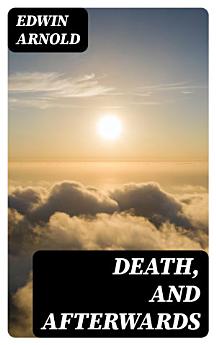Death, and Afterwards
Edwin Arnold
May 2022 · DigiCat
Ebook
82
Pages
family_home
Eligible
info
reportRatings and reviews aren’t verified Learn More
About this ebook
In 'Death, and Afterwards,' Edwin Arnold presents a contemplative exploration of the most eternal of human enigmas: the nature of death and existence beyond it. Through Arnold's poetic prose, readers embark on a philosophical journey that traverses history and culture, juxtaposing ancient wisdom with contemporary thought. The book is not merely a comparative study but a deep-dive into how civilizations have grappled with mortality's enigmatic finality and the possibility of an afterlife. Arnold's literary style is fluid and evocative, replete with rich textual allusions that place the discourse firmly in a broad literary and philosophical context. The treatise engages the reader with a tapestry of beliefs, from Islam and Buddhism to Christianity, presenting a nuanced mosaic of humanity's quest for meaning beyond life's fleeting span. Edwin Arnold, an English poet renowned for his reflections on spiritual themes, brings a unique blend of erudition and poetic sensibility to 'Death, and Afterwards.' His interest in global beliefs and his erudite understanding of diverse religious doctrines, amassed from extensive travels and studies, culminate in the writing of this profound work. Arnold's insights into the afterlife are drawn from a wellspring of personal and intellectual engagement with the world's vast metaphysical landscape. This book is a recommended read for those who seek a profound, cross-cultural examination of life's ultimate transition. Arnold's work offers solace and inspiration, bridging the chasm between the known and the mysterious with grace and scholarly eloquence. It is a text that invites introspection and dialogue, appealing to anyone curious about the varied human answers to what lies beyond the veil of death, and for readers who appreciate meditations that are as poetic as they are philosophical.
About the author
Edwin Arnold (1832–1904) was a renowned British poet and journalist, acclaimed for his rich contributions to English literature in the Victorian era. Born on June 10, 1832, in Gravesend, Kent, Arnold developed a passion for the literary arts early in life. He attended King's College London and subsequently Oxford University, where he graduated with honors in classics. Arnold's literary career began in earnest with his work as a schoolmaster, but he soon turned to journalism, becoming the editor of The Daily Telegraph, one of the most influential newspapers of the time. Arnold's literary style is characterized by a deep appreciation for Eastern culture and spiritual themes, which he adeptly wove into his works. His most famous poem, 'The Light of Asia' (1879), is an epic that recounts the life and philosophy of Gautama Buddha, and became immensely popular, greatly influencing Western views on Eastern religions. In 'Death, and Afterwards' (1885), Arnold continues this exploration of spirituality, offering a profound contemplation on the afterlife from various cultural and philosophical perspectives. As a Victorian writer, Arnold's work reflects a blend of Romanticism and exoticism, serving not only as poetic expressions but also as windows into the diverse spiritual landscapes of the time. A prolific author, his other notable works include 'Indian Poetry' (1881) and 'The Song Celestial' (1885), which present English narrations of traditional Indian scriptures. Arnold's contributions to intercultural understanding and his poetic achievements earned him a lasting legacy in the annals of English literature.
Rate this ebook
Tell us what you think.
Reading information
Smartphones and tablets
Install the Google Play Books app for Android and iPad/iPhone. It syncs automatically with your account and allows you to read online or offline wherever you are.
Laptops and computers
You can listen to audiobooks purchased on Google Play using your computer's web browser.
eReaders and other devices
To read on e-ink devices like Kobo eReaders, you'll need to download a file and transfer it to your device. Follow the detailed Help Center instructions to transfer the files to supported eReaders.







